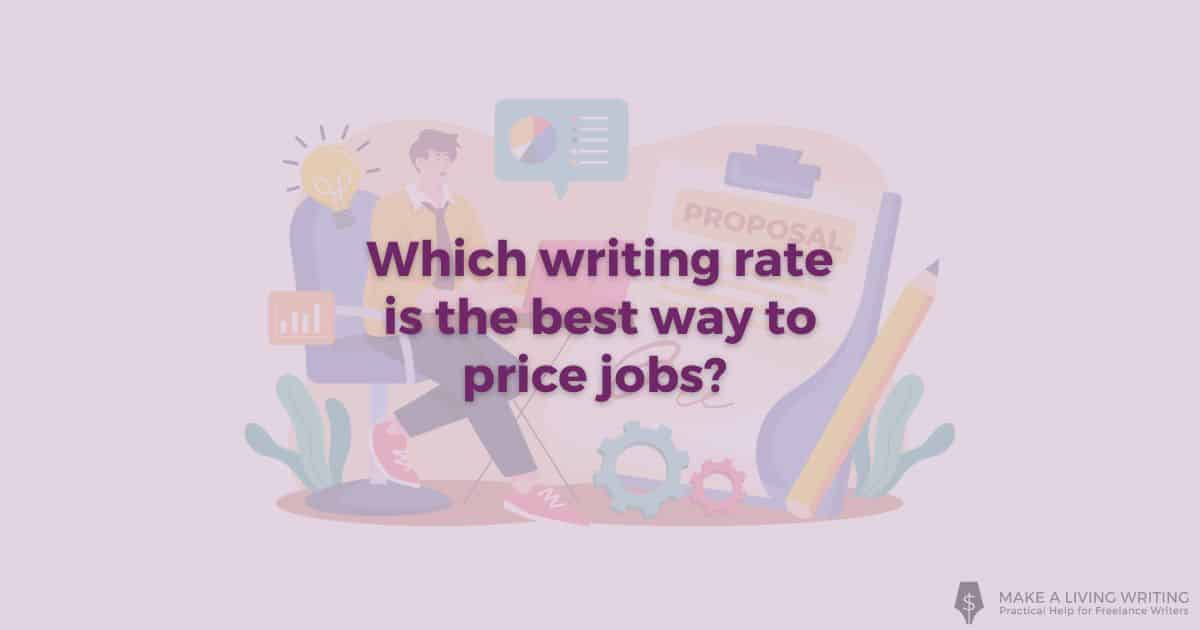There’s a lot of discussion online about writing rates. What’s the best way to bid a project? By the word? By the hour? By the project?
They all have their uses, especially since some publications and businesses are kind of in the habit of using one or the other of these methods for deciding what they’ll pay.
Which writing rate is the best way to price jobs?
To my mind, it’s by the hour.

Time is your most precious resource. You only have so many work hours in the year, so you need to make as much per hour as you can. Which leads me to my one important rule of pricing jobs:
No matter how you price the job, track your hours and figure out your hourly rate
Because if you don’t know your hourly rate, how can you work on raising it? How can you compare clients and know which to keep and which to drop?
Now, if you’re working for an ongoing copywriting client, I personally believe bidding by the project is best. Your client is happy because they know exactly what they’re going to pay, and you can budget for the amount you will earn.
The trick to choosing the best writing rate is creating a flat fee for that project that will give you what you want
You can only do that by getting some experience with how long it takes you to do things. Obviously, this setup rewards efficiency. If you’re unusually fast, you can bid on a par with other writers, but end up with a better hourly rate, and earn more over the course of the year.
Before the downturn, I thought high per-article fees were the answer to maximizing earnings. But I’ve learned that’s not always true. When I was scrambling around for a few new clients in late 2008/early 2009, I got an offer from an old editor friend to write some quick articles for $100 apiece, just based on my knowledge of business topics, supplemented with a little online research. (Hey, it’s above my $50 an assignment limit, people!)
At first I was appalled. Prior to this time period, about the very lowest article rate I took was $300. Then I thought what the heck, and gave them a try.
I found I could write them in an hour to 90 minutes. A little quick math and hmmm…that’s $70-$100 an hour. Not too shabby. I’ve kept this work as good occasional filler projects . A quick scan of my bills showed I picked up $1,700 this way in 2010 in maybe 20 to 22 hours. So the lesson is: Any work that earns a high hourly rate is good writing work.
Of course, getting a client where they’ll let you simply bill for however many hours you’re spending on their projects each month is the ideal. Then you know you’re getting paid for every hour you work. I had a client like that at $95 an hour for more than a year, sending me work every month. I think right now, those jobs are harder to come by.
But billing hourly protects you against the evil that is scope creep: the situation where you bid a flat project fee, but then the parameters of the project keep growing, as does your time spent. Been lots of discussion of how to handle this sticky problem on LinkedIn.
Most publications tend to assign a price per word or give a flat article price. In which case, you may need to work on your efficiency to make sure your rate stays as good as possible.
But you can always ask for more money. I’ve gotten companies to add $50-$200 to an article assignment or more if they ended up wanting sidebars, or a longer length, or I knew they were a slow payer.
What do you prefer? Billing by the project, the hour or the word?
Photo via Flickr user zoutedrop

